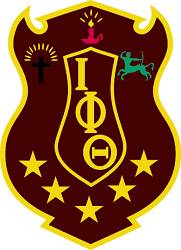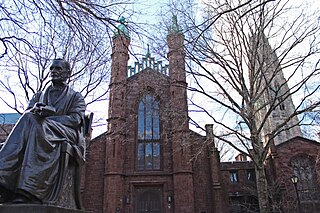Related Research Articles

Yale College is the undergraduate college of Yale University. Founded in 1701, it is the original school of the university. Although other Yale schools were founded as early as 1810, all of Yale was officially known as Yale College until 1887, when its schools were confederated and the institution was renamed Yale University. It is ranked as one of the top colleges in the United States.

Ferris State University is a public university with its main campus in Big Rapids, Michigan. It was founded in 1884 as the Big Rapids Industrial School by Woodbridge Nathan Ferris, an educator from Tioga County, New York, who later served as governor of the State of Michigan and finally in the US Senate where he remained until his death in 1928. From its foundation, the school accepted female students beginning with its first graduating class. It is also the only public university in Michigan to be founded by an individual.

Phi Iota Alpha (ΦΙΑ), established on December 26, 1931, is the oldest Latino Fraternity in existence, and works to motivate people, develop leaders, and create innovative ways to unite the Latino community. The organization has roots that stem back to the late 19th century to the first Latin American fraternity, and the first Latin American student organization in the United States. The brotherhood is composed of undergraduate, graduate, and professional men committed towards the empowerment of the Latin American community by providing intensive social and cultural programs and activities geared towards the appreciation, promotion and preservation of Latin American culture.
African-American studies is an interdisciplinary academic field that is primarily devoted to the study of the history, culture, and politics of black people from the United States. African American studies are a sub-field of African diaspora studies and Africana studies, the study of the people of African origin worldwide. The field has been defined in different ways, but taken broadly, it not only studies African slave descendants but also any community of the African diaspora linked to the Americas. The field includes scholars of African-American literature, history, politics, and religion as well as those from disciplines such as sociology, anthropology, cultural studies, psychology, education, and many other disciplines within the humanities and social sciences. And, increasingly, African-American Studies departments are hiring and partnering with STEM scholars.

The University of New Haven (UNH) is a private university in West Haven, Connecticut, which borders the larger city of New Haven and Long Island Sound. Between its main campus in West Haven and its graduate school campus in Orange, Connecticut, the university grounds span approximately 122 acres of land. The university includes the College of Arts and Sciences, the Pompea College of Business, the Tagliatela College of Engineering, the Henry C. Lee College of Criminal Justice and Forensic Sciences, and the School of Health Sciences.

Virginia State University is a public historically black land-grant university in Ettrick, Virginia. Founded on March 6, 1882, Virginia State developed as the United States's first fully state-supported four-year institution of higher learning for black Americans. The university is a member school of the Thurgood Marshall College Fund.

Alpha Sigma Phi (ΑΣΦ), commonly known as Alpha Sig, is a collegiate men's social fraternity with 179 active chapters. Founded at Yale in 1845, it is the 10th oldest greek letter fraternity in the United States.
Alpha Phi Alpha Fraternity, Inc. (ΑΦΑ) is the first intercollegiate historically African American fraternity. It was initially a literary and social studies club organized in the 1905–1906 school year at Cornell University but later evolved into a fraternity with a founding date of December 4, 1906. It employs an icon from Ancient Egypt, the Great Sphinx of Giza, as its symbol. Its aims are "Manly Deeds, Scholarship, and Love For All Mankind," and its motto is "First of All, Servants of All, We Shall Transcend All." Its archives are preserved at the Moorland-Spingarn Research Center.

La Unidad Latina, Lambda Upsilon Lambda Fraternity, Inc. is a Latino-based collegiate non-profit social fraternity. It was founded at Cornell University in Ithaca, New York on February 19, 1982, and has 71 active undergraduate chapters and 14 graduate alumni professional chapters in universities and cities across the United States. La Unidad Latina, Lambda Upsilon Lambda Fraternity, Incorporated is the only Latino fraternity to be chartered at all 8 Ivy League universities. While founded on Latino principles, Lambda Upsilon Lambda has been open to men of all races since its inception. The fraternity is a member of The National Association of Latino Fraternal Organizations (NALFO).

The National Pan-Hellenic Council (NPHC) is a collaborative umbrella council composed of historically African American fraternities and sororities. The nine NPHC Greek-letter organizations are sometimes collectively referred to as the "Divine Nine (D9)". The member/partner organizations have not formally adopted nor recommended the use of this term to describe their collaborative grouping. The NPHC was formed as a permanent organization on May 10, 1930 on the campus of Howard University, in Washington, D.C. with Matthew W. Bullock as the active Chairman and B. Beatrix Scott as Vice-Chairman. NPHC was incorporated under the laws of the State of Illinois in 1937 and is headquartered in Decatur, Georgia.

Iota Phi Theta Fraternity, Inc. (ΙΦΘ) is a historically African American fraternity. It was founded on September 19, 1963, at Morgan State University in Baltimore, Maryland, and now has initiated over 30,000 members. Members of the close-knit afrocentric fraternity proudly embrace the organization’s youth, uniqueness, individualism and modern idealism. As a contemporary organization, many members have had the great honor of meeting, fellowshipping with and/or engaging in personal or virtual discussions with one or more of their founders. Today there are over 301 undergraduate and alumni chapters, as well as colonies located in 40 U.S. states, the District of Columbia, The Bahamas, Colombia, South Korea, and Japan.
Belford Vance Lawson Jr. was an American attorney and civil rights activist who made at least eight appearances before the U.S. Supreme Court. He was the first African-American man to win a case before the Supreme Court and the first African-American president of YMCA.

Gerald Eustis Thomas, was an American naval officer, diplomat and academic. He was the second African American to achieve the rank of Rear Admiral in the U.S. Navy.
The African-American upper class is a social class that consists of African-American individuals who have high disposable incomes and high net worth. The group may include highly paid white-collar professionals such as engineers, lawyers, accountants, doctors, politicians, business executives, venture capitalists, CEOs, celebrities, entertainers, entrepreneurs and heirs. This social class, sometimes referred to as the black upper class, the black upper middle class or black elite, represents one percent of the total black population in the United States.
The North American fraternity and sorority system began with students who wanted to meet secretly, usually for discussions and debates not thought appropriate by the faculty of their schools. Today they are used as social, professional, and honorary groups that promote varied combinations of community service, leadership, and academic achievement.
James P. Comer is currently the Maurice Falk Professor of Child Psychiatry at the Yale Child Study Center and has been since 1976. He is also an associate dean at the Yale School of Medicine. As one of the world's leading child psychiatrists, he is best known for his efforts to improve the scholastic performance of children from lower-income and minority backgrounds which led to the founding of the Comer School Development Program in 1968. His program has been used in more than 600 schools in eighty-two school districts. He is the author of ten books, including the autobiographical Maggie’s American Dream: The Life and Times of a Black Family, 1988; Leave No Child Behind: Preparing Today's Youth for Tomorrow's World, 2004; and his most recent book, What I Learned in School: Reflections on Race, Child Development, and School Reform, 2009. He has also written more than 150 articles for Parents (magazine) and more than 300 articles on children's health and development and race relations. Dr. Comer has also served as a consultant to the Children's Television Workshop which produces Sesame Street and The Electric Company. He is a co-founder and past president of the Black Psychiatrists of America and has served on the board of several universities, foundations, and corporations. He has also lectured and consulted widely not only across the United States at different universities, medical schools, and scientific associations, but also around the world in places such as London, Paris, Tokyo, Dakar, Senegal and Sydney, Australia. For his work and scholarship, Dr. Comer has been awarded 47 honorary degrees and has been recognized by numerous organizations.
The Department of African American Studies (AAS) at Syracuse University is an academic department supporting Africana studies. It is located at Syracuse University in Syracuse, New York. It is part of the Syracuse University College of Arts and Sciences. The Department supports an external community based unit that is a part of the department and has played a central role in shaping culture and arts in the Syracuse city community - Community Folk Art Center (CFAC). It has also supported the Paul Robeson Performing Arts Company (PRPAC) in the past. These are both independent units that were housed or founded by the department The department also houses the award-winning library, the Martin Luther King Jr. Memorial Library. It currently oversees the internationally recognized university wide initiative "Africa Initiative". Its other projects include the nationally recognized "Paris Noir" and the Ford Foundation Environmental Justice and Gender Project. It has had a long history of activism within the university, surrounding community, and abroad through its strong international network. The AAS department has housed many renowned scholars in African, Afro-Caribbean, African-American, Afro-Latin American, and Afro-European studies.

Dwight Hall at Yale is a student-run, staff supported public service and social action organization at Yale University. Founded in 1886, "The Hall" stands as one of the oldest and most storied collegiate public service institutions in the nation. It is the largest student-run organization at Yale College.
Claudia L. Thomas is the first female African-American orthopedic surgeon in the United States. She attended Medical School at Johns Hopkins University. She was the first African-American and woman to be admitted to the Yale Medical Program in orthopedics. She strives to increase the number of minority students in medical school and to help decrease racial bias in the healthcare industry. While in her undergrad at Vassar College she helped form the Students' Afro-American Society (SAS), whose members pushed for the creation of a Black Studies program at the college. She has overcome kidney failure which was exacerbated by a hurricane and is a cancer survivor.
References
- ↑ "About Us, Afro-American Cultural Center at Yale". Yale University. Archived from the original on 14 January 2012. Retrieved 11 February 2012.
- ↑ P., Danky, James (1998-01-01). African American newspapers and periodicals : a national bibliography. Harvard Univ. Press. ISBN 0674007883. OCLC 231774980.
- ↑ Yale Daily News no. 64 December 13, 1968: Faculty Okays 'Afro- American' New Black Major
- ↑ "Resident Groups, Afro-American Cultural Center at Yale". Yale University. Archived from the original on 15 January 2012. Retrieved 11 February 2012.